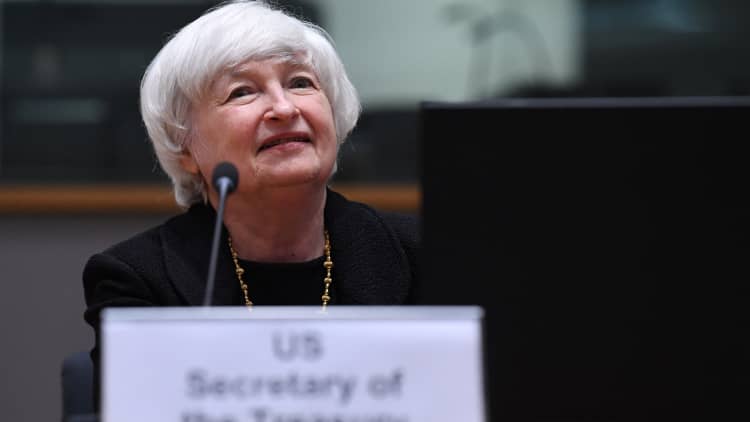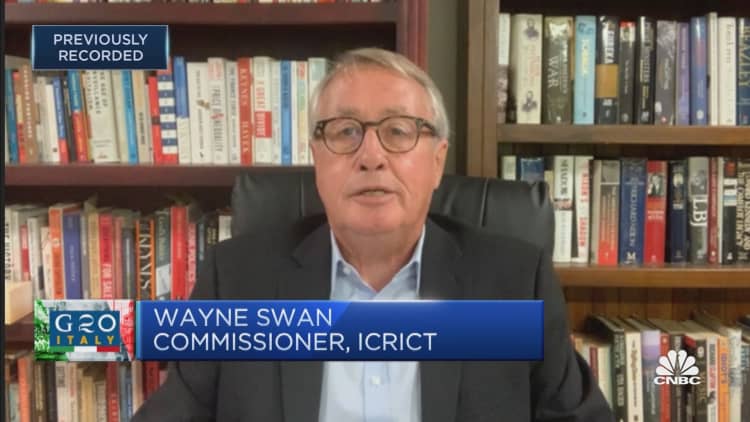Europe's biggest banks are booking an average of 20 billion euros ($23.7 billion) in tax havens every year, according to a new report.
That accounts for 14% of their total profits, the analysis found.
Published Monday, the report from the EU Tax Observatory looked into the activities of 36 systemic European banks, headquartered in 11 countries across Europe, that have been subject to mandatory country-by-country reporting on their actions since 2015.
Seventeen jurisdictions were included in the report's tax haven list: the Bahamas, Bermuda, the British Virgin Islands, the Cayman Islands, Guernsey, Gibraltar, Hong Kong, Ireland, Isle of Man, Jersey, Kuwait, Luxembourg, Macao, Malta, Mauritius, Panama and Qatar.

The report noted that about 65% of banks' profits were reported as being made abroad through affiliates between 2014 and 2020, with researchers documenting a misalignment between the countries where profits were booked and those where employees were located. Profits per employee were also far larger in tax havens than in other countries, according to the report, with subsidiaries in tax havens reporting high profitability and profit margins.
Researchers also pointed out that 25% of the banks' profits were booked in countries where the effective tax rate was lower than 15%.
"Taken together, this evidence indicates a significant presence and stable use of tax havens by European banks over the years," they said in the report.
"Bank profitability in tax havens is abnormally high: 238,000 euros per employee, as opposed to around 65,000 euros in non-haven countries," the authors added. "This suggests that the profits booked in tax havens are primarily shifted out of other countries where service production occurs."
Variation between banks
The use of tax havens varied considerably between banks, the analysis found. The mean percentage of profits booked in tax havens between 2014 and 2020 was around 20%, the data showed, but this ranged from 0% to 58%.
Several banks were identified by researchers as having a "relatively high presence in tax havens."
"We observe a diversity of situations: for HSBC, the bulk of haven profits come from just one haven [Hong Kong], while in other cases multiple tax havens are involved," they said in the report.

HSBC booked a mean 58% of its pre-tax profits in tax havens between 2014 and 2020, according to the study, making it the lender funneling the largest percentage of profits into the EUTO's list of tax havens.
"HSBC is the largest bank in Hong Kong, with circa 30,000 employees, and because of our heritage, size of operations and strategy, a significant proportion of the group's profits continue to arise there," a spokesperson for HSBC told CNBC via email. "HSBC does not employ tax avoidance strategies to artificially divert profits to low-tax jurisdictions."
Standard Chartered booked an average of around a third of its pre-tax profits in tax havens, according to the report, while Deutsche Bank, Nord LB and RBS all booked, on average, more than 20% of their pre-tax profits in tax havens between 2014 and 2020.
A spokesperson for Standard Chartered told CNBC that the bank has substantial commercial operations in both high tax and low tax jurisdictions.
"We do not artificially divert profits to low tax jurisdictions," they said in a statement. "Tax is considered as part of relevant business decisions and we only engage in tax planning that supports a genuine commercial activity. We do not enter into transactions whose sole purpose is to minimize or reduce tax cost."
Meanwhile, a Deutsche Bank spokesperson told CNBC via email that the lender was represented by active subsidiaries and branches in almost 60 countries.
"None of these countries are listed on the current EU list of non-cooperative countries and territories for tax purposes. As a matter of principle, Deutsche Bank reports its profits in the countries in which they are generated, this means that profits are also taxed in those countries," they said. "Depending on the type of business activity there may be different levels of profit per employee. The effective tax rate of Deutsche Bank Group in 2020 was 39%."
At the other end of the scale, Bankia BFA, Erste, Nykredit Realkredit, Swedbank and Banco Sabadell booked none of their profits in tax havens during the seven-year sample period.

Eight banks, including Intesa Sanpaolo and HSBC, increased their presence in tax havens over the sample period, according to the EUTO. Seven lenders kept their presence in havens stable, while 16 banks decreased their use of tax havens.
The mean effective tax rate paid by the banks in the EUTO's sample was 20%, ranging from 10% to 30%. Seven banks, the EUTO said, "exhibit a particularly low effective tax rate" of 15% or less: RBS, Barclays, Bayern LB, Nord LB, HSBC, KBC and Intesa Sanpaolo.
Spokespersons for Nord LB, RBS, Barclays, Bayern LB, KBC and Intesa Sanpaolo were not immediately available for comment when contacted by CNBC.
The average corporate tax rate in the EU was 20.79% in 2020, having declined every year since 2014. Across the whole of Europe, the 2020 rate was 19.03%, with the rate of corporate tax on the continent also seeing a gradual decline since 2014. Rates vary between European countries.
Call for minimum tax rate
In July, 130 countries backed an OECD plan to reform international frameworks in a bid to ensure multinational companies pay a fair share of tax wherever they operate. The reforms include plans for a global minimum rate of 15% for corporation tax, which the OECD estimates would generate around $150 billion in additional global tax revenues every year.
EUTO researchers calculated that if this rate was imposed globally, the European banks used in its analysis would have to pay 3 to 5 billion euros more in taxes every year. If the global minimum rate was raised to 21%, they would pay an additional 6 to 9 billion euros annually. With a 25% minimum corporation tax rate, the 36 European banks included in the study would pay 10 to 13 billion euros in additional taxes annually.

